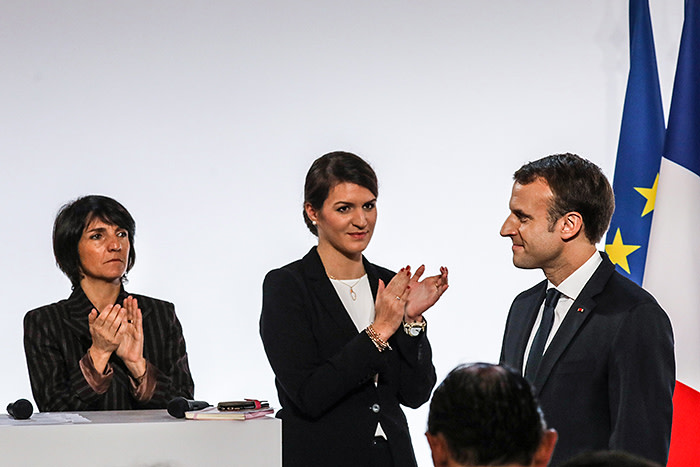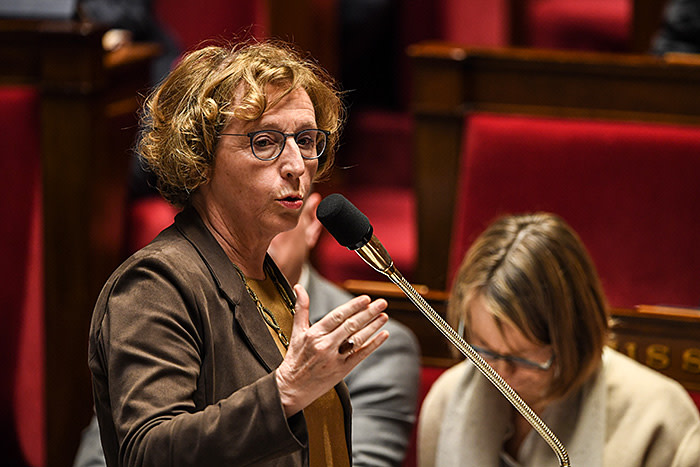Macron prepares to act on France’s gender pay gap

Roula Khalaf, Editor of the FT, selects her favourite stories in this weekly newsletter.
Emmanuel Macron’s feminist activism is expected to extend further into the realm of business this month, when the French president outlines a plan to close the country’s 25 per cent gender pay gap.
It is high time: Mr Macron, who has chosen the fight for gender equality as the “grande cause nationale” of his presidency, is the first French leader in three decades to show a willingness to tackle a problem that even the country’s feminists have long ignored.
The president, who will visit property investment business Gecina on March 8, International Women’s Day, is considering, advisers say, an obligation for employers to agree with employees and unions on corrective financial measures to reach equal pay, as well as initiatives to improve gender balance when companies hire and promote staff internally.
Mr Macron will probably suggest enforcing existing sanctions more systematically. Advisers also say new, more stringent legislation is being considered.
“This [gender pay gap] issue must become a priority in the dialogue” between unions and employers, Muriel Pénicaud, the French labour minister, told the Sunday newspaper Le Journal du Dimanche in January.
In particular, Ms Pénicaud has vowed to focus on “equal pay” — or erasing, by 2022, the estimated 9 per cent wage difference between French men and women holding similar positions and with similar experience and education. She cited the “unacceptable” case of a female graduate of HEC Paris, France’s leading business school, who had been hired at a lower pay level than a male graduate with the same education.
Mr Macron’s initiatives on the pay gap are part of a wider plan to promote gender equality. After being elected, he made a point of fielding women in easily winnable constituencies in legislative elections, increasing the number of female MPs in France to about 40 per cent in the national assembly, up from a quarter in the previous legislature. About half his government ministers are women.
The gender equality minister, Marlène Schiappa, has named and shamed a dozen companies that failed to disclose a gender equality strategy, as required by law. Ms Schiappa, a supporter of the #BalanceTonPorc (or “expose your pig”) campaign on social media — the French version of the #MeToo campaign that has encouraged women to identify alleged sexual harassers — is preparing legislation against street harassment.

Olga Trostiansky, the head of Laboratoire de l’Égalité, a think-tank that has made recommendations on the gender pay gap to the government, says the subject has long sat at the bottom of the pile in France for historical and cultural reasons.
“The big French feminist battles have centred on social reforms such as the legalisation of abortion and the rights of women to take over control of their body,” she says. “Over the past three to four decades, there have been several plans to fight against violence inflicted on women. Seriously tackling equality in the work environment is something new.”
Male-dominated unions and employers’ trade bodies have not confronted the matter, she adds: “You won’t see big protests in the streets because of the 25 per cent pay gap.”
French law requires companies to put in place a plan to narrow the gap but, until 2013, they were not penalised for failing to do so. In the past five years, about 3,000 companies have been told to abide by the law, leading to 157 fines. Ms Pénicaud suggested in January that this may intensify, noting that only 61.4 per cent of French companies had struck a deal with the unions to fix gender pay imbalance.
Some companies have been creative in addressing the question, says Ms Trostiansky, a former diversity manager at Crédit Agricole, France’s largest retail banking group. For the past 10 years, LCL, formerly Crédit Lyonnais and now part of Crédit Agricole, has been closely monitoring its pay gap to smooth out abnormal differences.
The bank is doing so by using several metrics to correct biases. Not only must individual bonuses and pay increases be the same on average for women and men, but also the number of women benefiting from pay increases must at least equal the number of men receiving a rise.
Focusing on equal pay is one aspect of a broader problem, Ms Trostiansky notes. The pay gap arises not least because women hold eight in 10 part-time jobs, a reflection of an uneven sharing of the burden of childcare. Women also tend to miss pay increases when they take maternity leave. Some professions, she adds, are simply still too male-dominated. All this has far-reaching consequences for women’s financial independence and for their pensions.
“Improving the gender balance [in hiring] is as crucial as reaching equal pay,” says Ms Trostiansky.
The writer is the FT’s Paris bureau chief
Comments